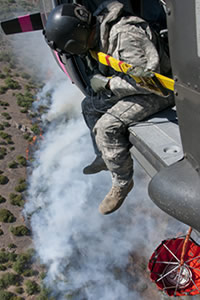What We Do
The Interagency Critical Incident Peer Support Program provides a number of services that include:
- Situational assessment for Agency Adminstrators, Managers, and others to help determine the appropriate response.
- Assist in determining the timing and type of support needed for each incident. Each process is put in place based on a methodical approach. Tactics are applied at the right time, in the right place and under the right circumstances.
- Commitment to providing services only within our established Boundaries of Competence and Standard of Care based on our education, training and supervised experience.
- Provide a Critical Incident Peer Support (CIPS) Group which includes the expertise and screening requirements of a licensed Mental Health Care Professional (Clinician) who is experienced in trauma.
- Support Incident Managment Teams, militia, and other agency non-fire employees affect by a critical incident.
- Provide Peer Supporters who can travel to the fire line, spike camp and other remote locations.
Effectiveness of Peer Support in Wildland Fire
Wildland fire and aviation personnel suffering from such synptoms have shown to benefit significantly from Critical Incident Peer Support. CISM or Peer Support is not therapy and does not "cure" people's stress responses. Rather, Peer Support is a proven means of assisting peope in their own healing by reducing the severity and longevity of sympotms, and thus restoring their ability to function much sooner.

Critical Incident Peer Support is not perfect, and some people suffering from traumatic shock may go on to develop post traumatic stress disorder (PTSD), but for the vast majority, CISM intervtion with Peer Support brings significant benefits. First developed for use with military combat veterans and then civilian first responders (police, fire, ambulance, emergency workers and disaster rescuers), it has now been adapted virtually everywhere there is a need to address traumatic stress in people's lives.













Social Media Connect